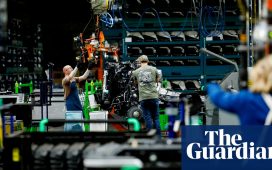The logistics industry is at a crossroads, exploring the best ways to implement real-world asset (RWA) tokenization. This transformative approach promises to enhance visibility and achieve supply chain goals. As the sector grapples with the decision between permissionless and permissioned blockchains, the stakes are high: the right choice could revolutionize efficiency and security across global supply chains.
Which blockchain infrastructure—permissionless and permissioned blockchains—is best suited for the logistics industry’s adoption of real-world asset tokenization?
Adam Blumberg, Co-Founder of Interaxis, provides insights into this critical decision on this clip from a full episode of MarketScale’s premiere debate and discussion roundtable, Experts Talk. Drawing from his experience and observations, particularly in industries like oil and gas and organic food production, Blumberg evaluates the advantages and drawbacks of both permissionless and permissions blockchains in the context of logistics.
Main Takeaways:
- Industry-Specific Blockchains: Certain sectors, like oil and gas, have started adopting permissioned blockchains to address specific supply chain issues, providing a sense of security by keeping transactions relatively private.
- Adoption Challenges: While permissioned blockchains offer a controlled environment, they pose challenges in terms of integration with the broader decentralized finance (DeFi) ecosystem, potentially limiting efficiency gains.
- Technological Advancements: As blockchain technology advances, the logistics industry might overcome initial reservations, gradually moving towards more open, permissionless systems to leverage global efficiencies.
- Case Examples: Companies like Topple are demonstrating the benefits of permissioned chains in organic food production, allowing controlled visibility that eases concerns over data privacy while showcasing the technology’s potential.
- Strategic Balancing: The logistics industry may initially adopt a hybrid approach, starting with permissioned blockchains to build trust and familiarity, before potentially transitioning to permissionless models to fully exploit the advantages of decentralized finance and global interoperability.
By weighing these perspectives, industry leaders can make informed decisions on blockchain infrastructure, paving the way for a more efficient and secure future in logistics.
Article written by MarketScale.












